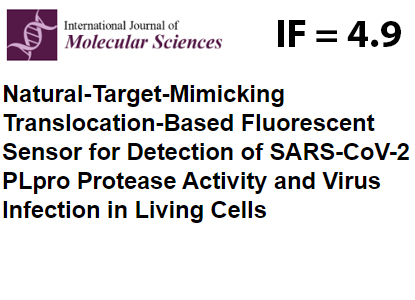
Natural-Target-Mimicking Translocation-Based Fluorescent Sensor for Detection of SARS-CoV-2 PLpro Protease Activity and Virus Infection in Living Cells
The papain-like protease PLpro plays a key role in the life cycle of the coronavirus SARS-CoV-2, making this enzyme a promising target for antiviral therapy. In this work a genetically encoded fluorescent sensor for PLpro activity was created. A distinctive feature of the sensor is its design closely mimicking the natural target of PLpro. A high-contrast translocation response (14-fold change in the signal ratio in the nucleus and cytoplasm) makes it possible to reliably detect PLpro activity in human cell cultures not only in the recombinant protease overexpression model, but also during infection with the SARS-CoV-2 virus, as a team of scientists from the Laboratory of genetically encoded molecular tools of IBCH RAS has shown in collaboration with Institute of Molecular Biology of the Russian Academy of Sciences and the Gamaleya Center for Epidemiology and Microbiology. The results are published in the International Journal of Molecular Sciences.
july 3, 2024

